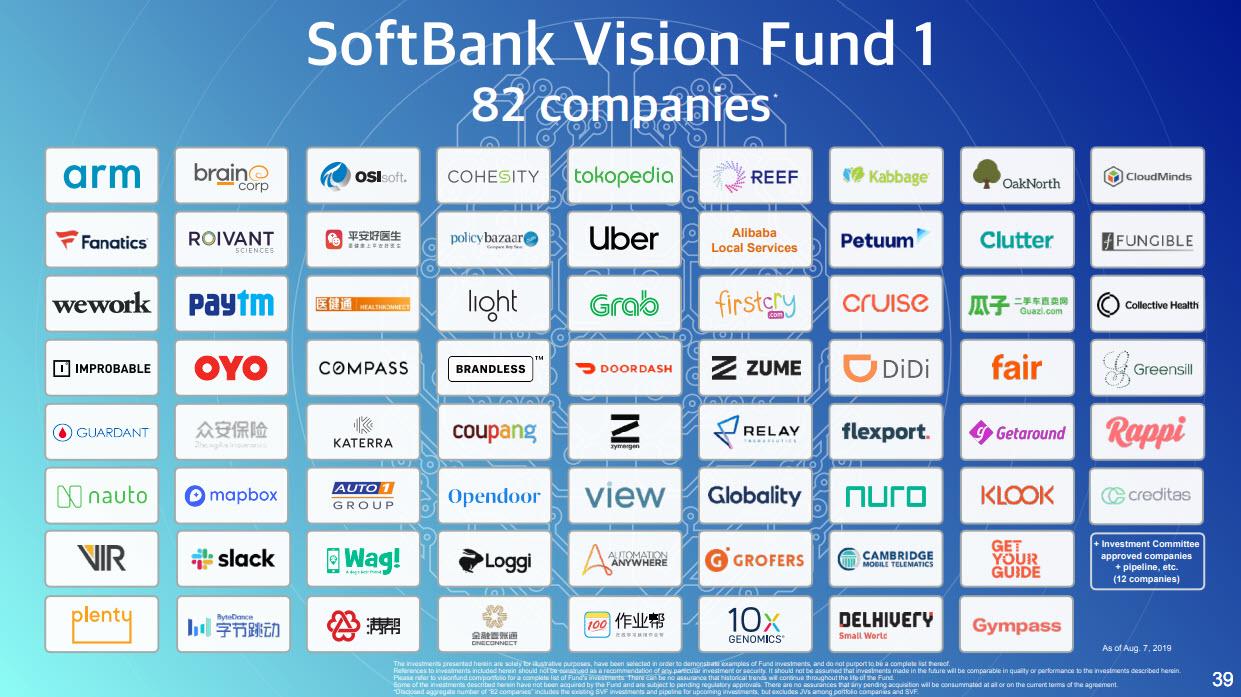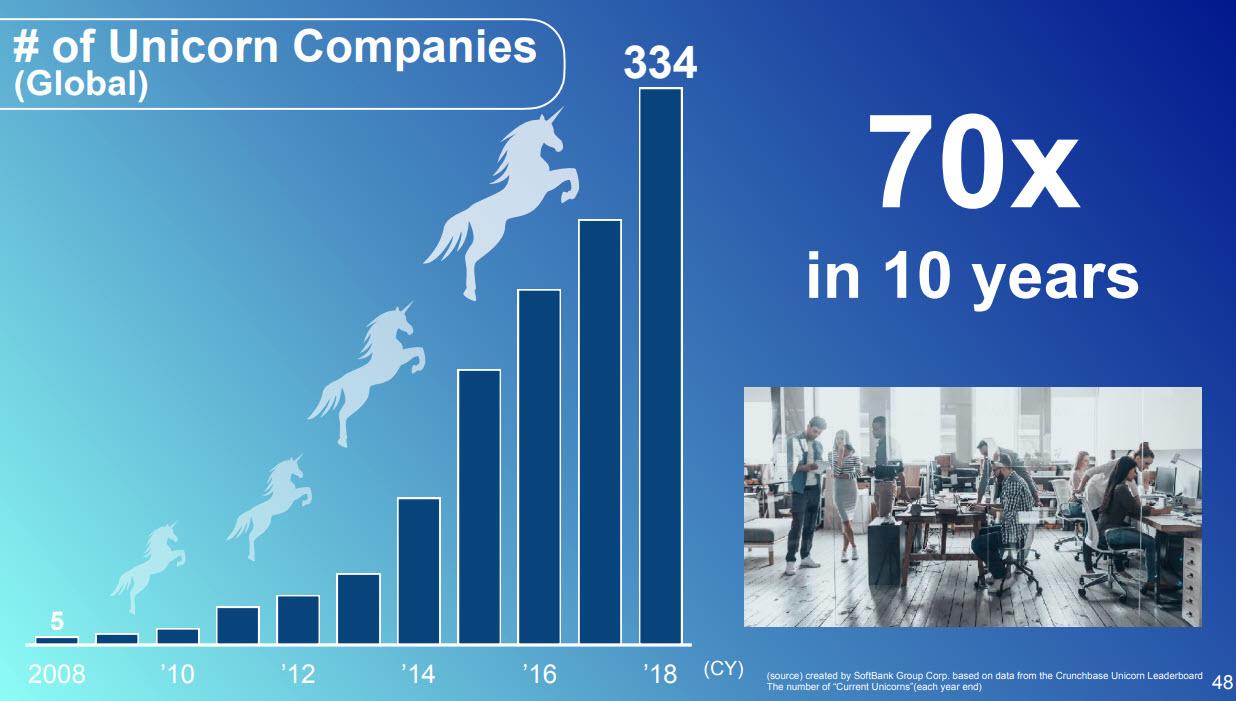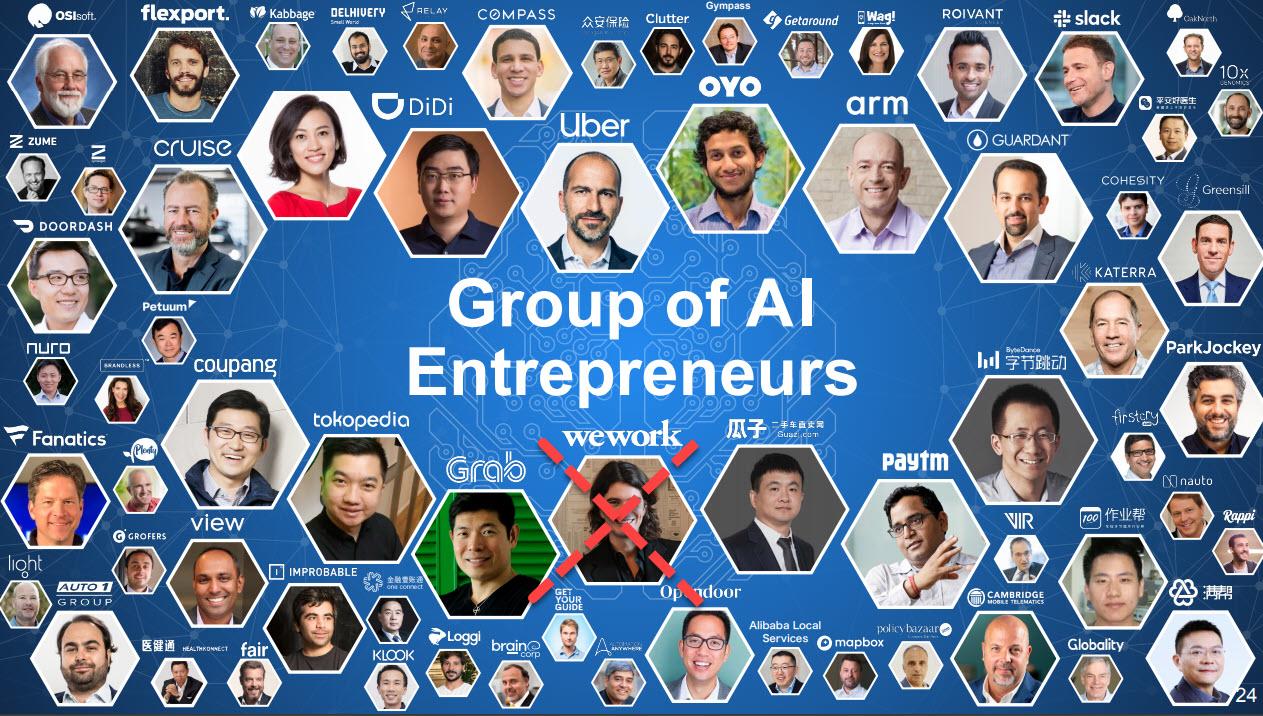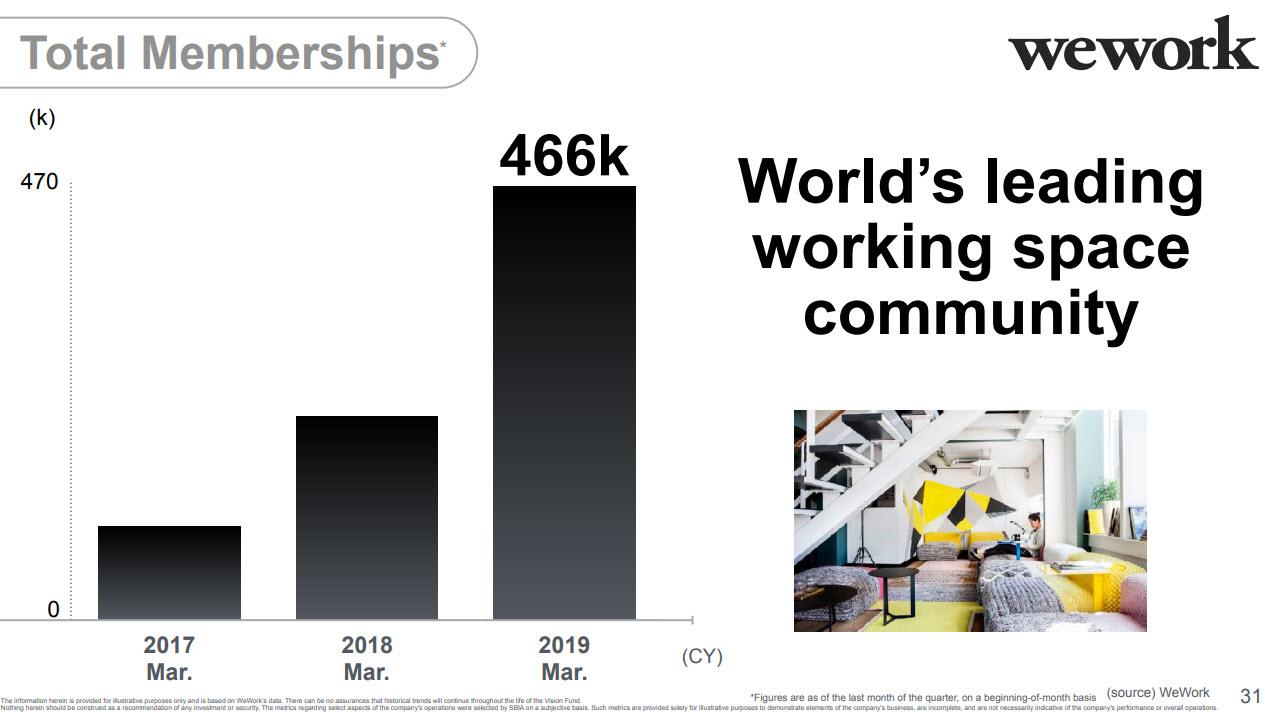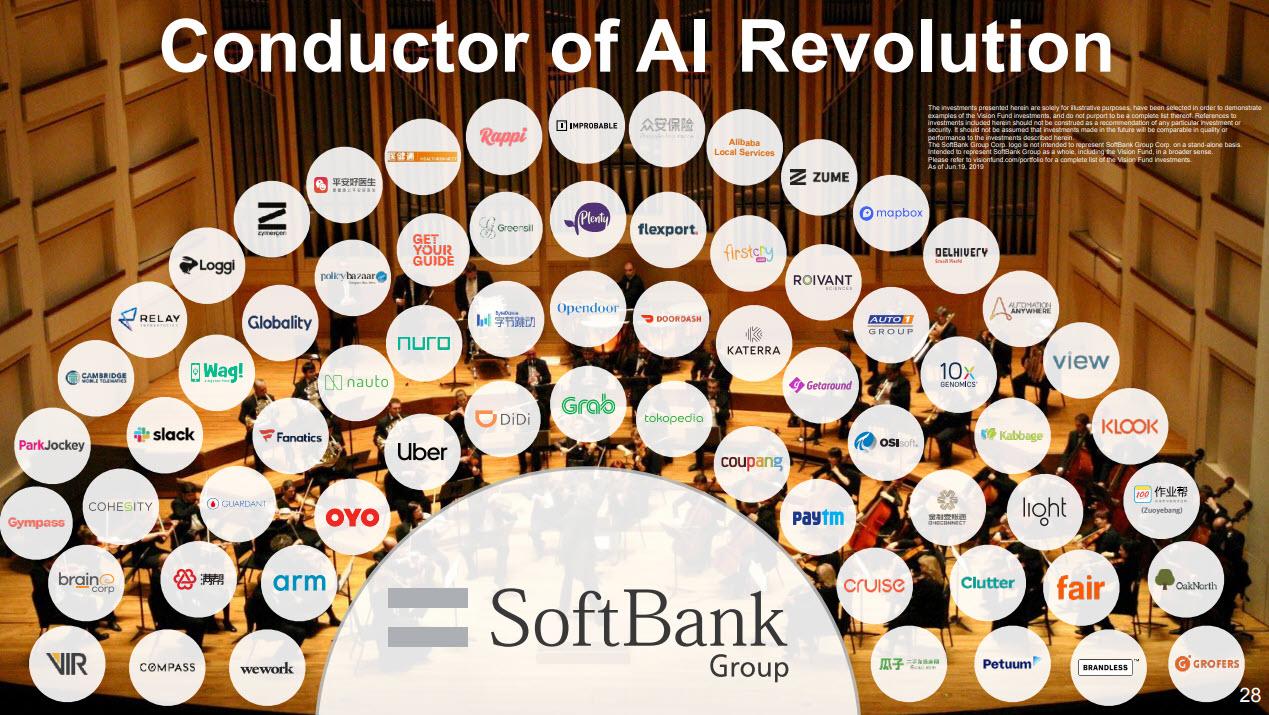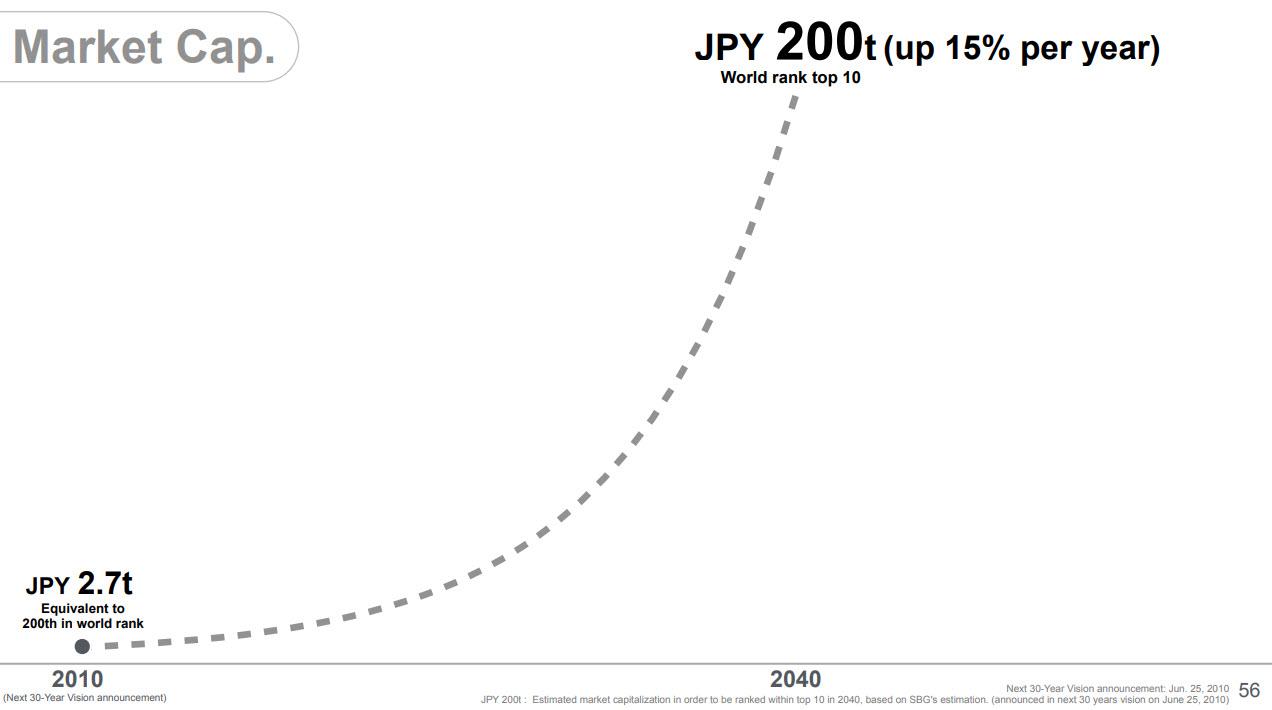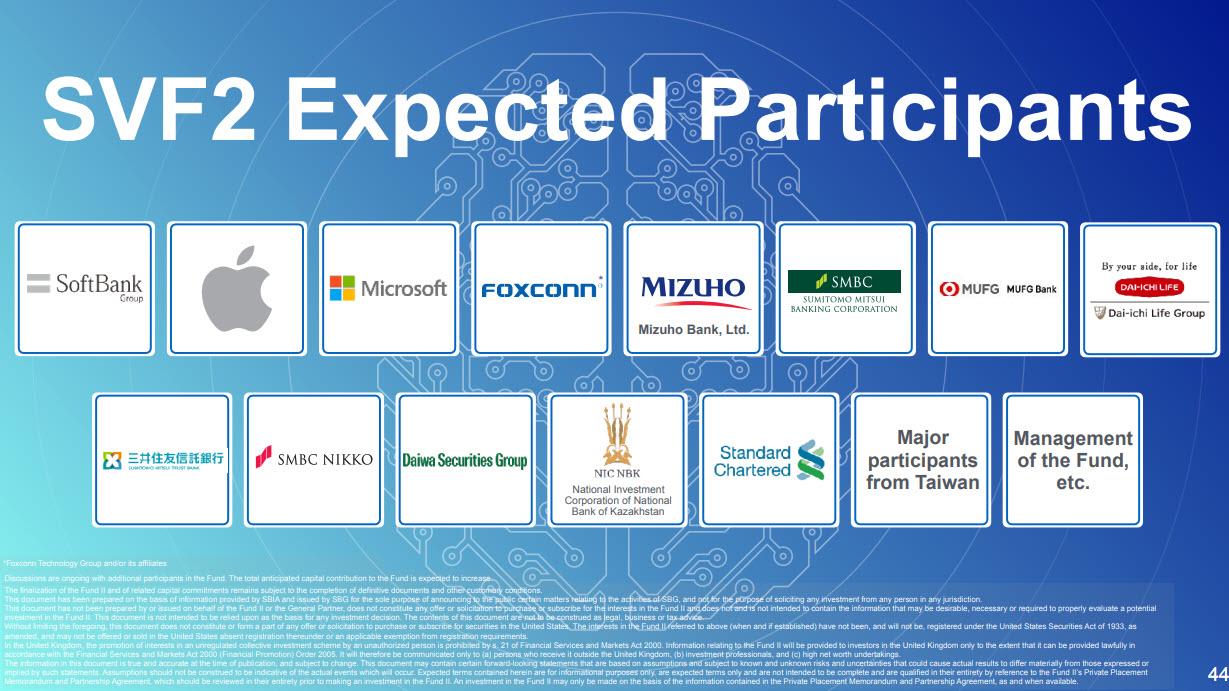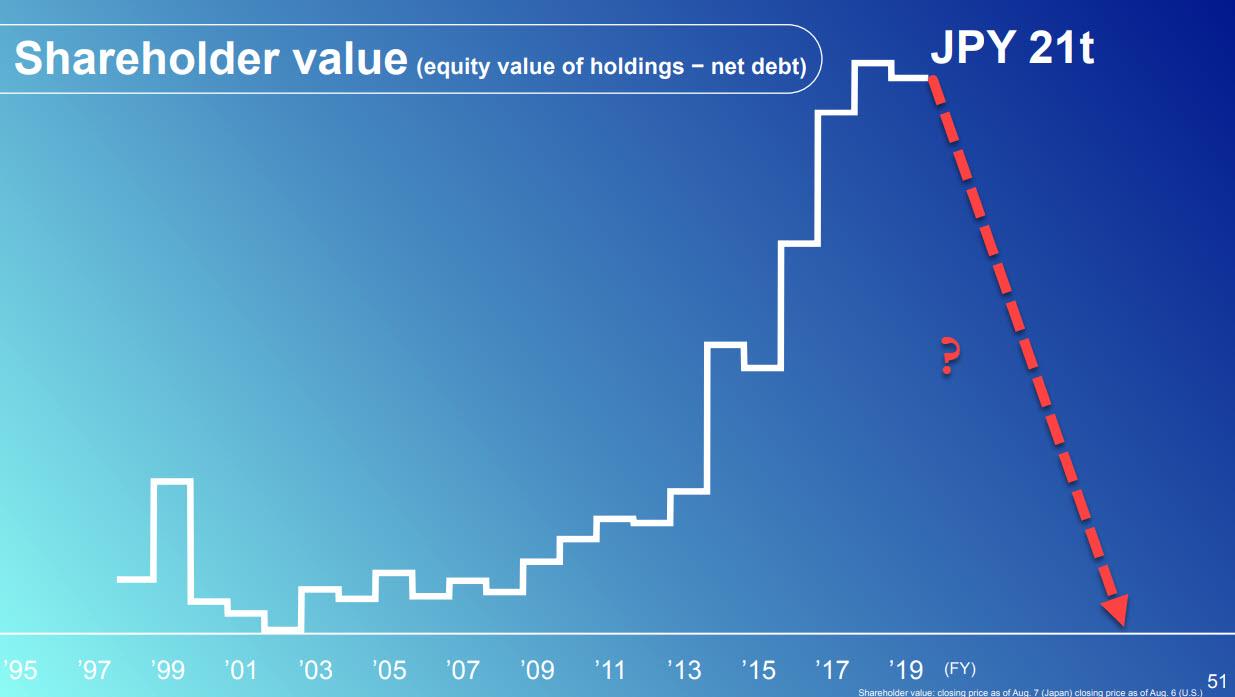Take a close look at the following two slides which have been a staple presence in every SoftBank presentation in recent quarters.
(Click to enlarge)
(Click to enlarge)
Actually, add these two charts to the mix:
(Click to enlarge)
(Click to enlarge)
We somehow doubt we will see any, if not all of these charts, in any future Softbank presentation.
Why? Because, in a brutal wake up call for Japan's SoftBank, which for years has drifted happily in the miasma of central bank liquidity-induced delusion with just the right dose of "humility" seeing itself as the "conductor of the AI revolution"...
(Click to enlarge)
... and with just the right dose of insanity projecting its market cap to do this in 20 years...
(Click to enlarge)
... Bloomberg reports that the bank/telecom/venture investor/whatever is planning to take a writedown to its Vision Fund of at least $5 billion to reflect a plunge in the value of some of its biggest holdings, including WeWork and Uber Technologies.
According to Bloomberg sources, the Japanese parent of the $100 billion Vision Fund is set to unveil the writedown when SoftBank announces second-quarter earnings on Nov. 6, mostly due to the Vision Fund’s holdings in ride-hailing giant Uber and WeWork (we would say "We" but we probably have to pay Adam Neumann royalties for using that word), the devastated office sublettor which just lost $40 billion in value in a few weeks, that SoftBank had no choice but rescue earlier this week, and double down on its investment or else risk a total wipeout of its $9 billion or so existing investment.
As Bloomberg notes, whereas both Uber and WeWork were once "among the brightest stars in the SoftBank constellation", prominently displayed in every company presentation, they are now among its worst performers.
... the collapse in valuations of these unicorns have not only prompted rhetorical questions whether the BOJ will be called in to bailout SoftBank in the not too distant future, but also prompted questions about billionaire Masayoshi Son’s investment acumen (does he actually do any analysis on his investments) and credibility at a time he’s trying to raise an even larger successor to his original mega fund, the Vision Fund 2...
(Click to enlarge)
... which SoftBank hopes will be even bigger than the first Vision Fund, which us in large part backed by SoftBank, Saudi Arabia’s Public Investment Fund and Abu Dhabi’s Mubadala Investment, and which has made 83 investments by June 30, according to an August disclosure. Maybe not: in fact, after the implosion of WeWork some of the most morbid jokes on Wall Street include Masa Son, a visit to a Saudi embassy and Jamal Khashoggi's bonesaw all in the same sentence. Related: NYU Professor: Tesla Could Lose 80% Of Its Value
In any case, as Bloomberg notes, "the tepid performance of ride-hailing stocks in particular has influenced the way SoftBank is thinking about valuing its investments in the sector" noting that public markets - unlike the massive billionaire circle jerk that are "private markets" - have "not been kind to either Lyft or Uber, which has tumbled more than 25% since its May initial public offering."
As a result, the Vision Fund is reassessing its recorded valuations of other ride-hailing companies, such as Didi and Grab Holdings: according to Bloomberg data, between June 30 and Sept. 30, the value of SoftBank’s 13% stake in Uber decreased by about $3.5 billion.
What is bizarre is that if the math is correct, the upcoming $5 billion writedown then implies a loss of only $1.5 billion in SoftBank's WeWork investment when considering its current valuation of just under $8 billion and the latest bailout package from Softbank of roughly the same size, Masa Son's updated mark on its existing WeWork investment should be orders of magnitude greater, if not the entire thing.
That's probably why Bloomberg also adds that the writedown could be "as high as $7 billion", as the amount has not yet been finalized and could still change. That surpasses some market projections: Mizuho Securities analyst Yusuke Hori has estimated declines in portfolio companies could force SoftBank to book as much as a 500 billion yen ($4.6 billion) valuation loss.
Yet the fact that even now SoftBank - which was left on the verge of bankruptcy when the dot com bubble burst - is unwilling to pull off the band aid and to admit it has made many mistakes in its pursuit of its target of a 200 trillion yen market cap, should be a major alarm to everyone in the financial world.
Meanwhile, as the WSJ journal reports this morning, after suffering billions of dollars of losses on its investment in WeWork, the Vision Fund "is scaling back its high-risk investing strategy and focusing more on improving corporate governance at portfolio companies, according to current and former executives at the fund."
Masayoshi Son, SoftBank’s chairman and CEO who also runs the Vision Fund, has told staffers at the fund to push the companies in which it owns stakes to generate cash, these people said, a drastic shift from his earlier demands that they spend aggressively to drive sales growth. Vision Fund executives are scrutinizing some deals more closely, such as one for a company that designs robots to cook hamburgers.
With investors suddenly balking at "growth" narratives and ridiculous mission statements (such as "elevating the world's consciousness") and focusing on profits, SoftBank finds itself in a corner, and following three years of rapid, tumultuous growth at any cost, the fund is also focusing on improving corporate governance at portfolio companies and possibly looking to reduce staff by asking some weaker employees to leave.
And just as WeWork is now engaging in mass layoffs, SoftBank itself could be next, with the WSJ noting that in recent weeks, "leaders of the fund’s investment teams have been asked to make lists of their weaker employees, possibly a prelude to small staff cuts" with both moves a first for the fund. Meanwhile, sensing what's coming, roughly a dozen investment staff have left on their own since the spring of this year, "many unhappy about what they see as a toxic culture with competing teams, inexperienced investment executives, and poor communication, as well as a risky incentive structure that, for some, made it less appealing to be at the fund, people familiar with the structure said."
In short, SoftBank's bubble has finally burst, and what comes next could be nothing short of disaster. Related: Three Stocks To Watch Ahead Of Earnings Season
But it's not just SoftBank that faces a grim future: the size of SoftBank's investments was large enough to dramatically affect the way the Silicon Valley startup ecosystem operates, as Bloomberg notes. The Vision Fund - whose massive portfolio spans numerous industries but has been dominated by transportation and logistics bets, with $28.3 billion of its total investments dedicated to this sector as of June 30 - reported that it had made cumulative investments of $71.4 billion, and had combined unrealized and realized gains from investments and related hedges of $20.2 billion; a year-on-year jump from $30.9 billion in investments and $5.2 billion in cumulative gains.
"Eventually this is going to come back to haunt them," said Asymmetric Advisors' strategist Amir Anvarzadeh said. The question is when.
For now, SoftBank’s shares slid 2.7% to their lowest since January (when SoftBank announced it would repurchase over 10% of its stock, sending it soaring to all-time high), putting the stock on track for a fourth straight day of losses.
The real question, however, is whether not WeWork, but SoftBank will turn out to be the most levered poster child for the liquidity excesses of the current asset bubble, and by extension, whether SoftBank will be the short of the century. While the answer will ultimately depend on what central bankers do over the next few years, here is our contribution (in red) to one of SoftBank's most egregious examples of hubris taken straight from its latest investor presentation.
(Click to enlarge)
By Zerohedge.com









